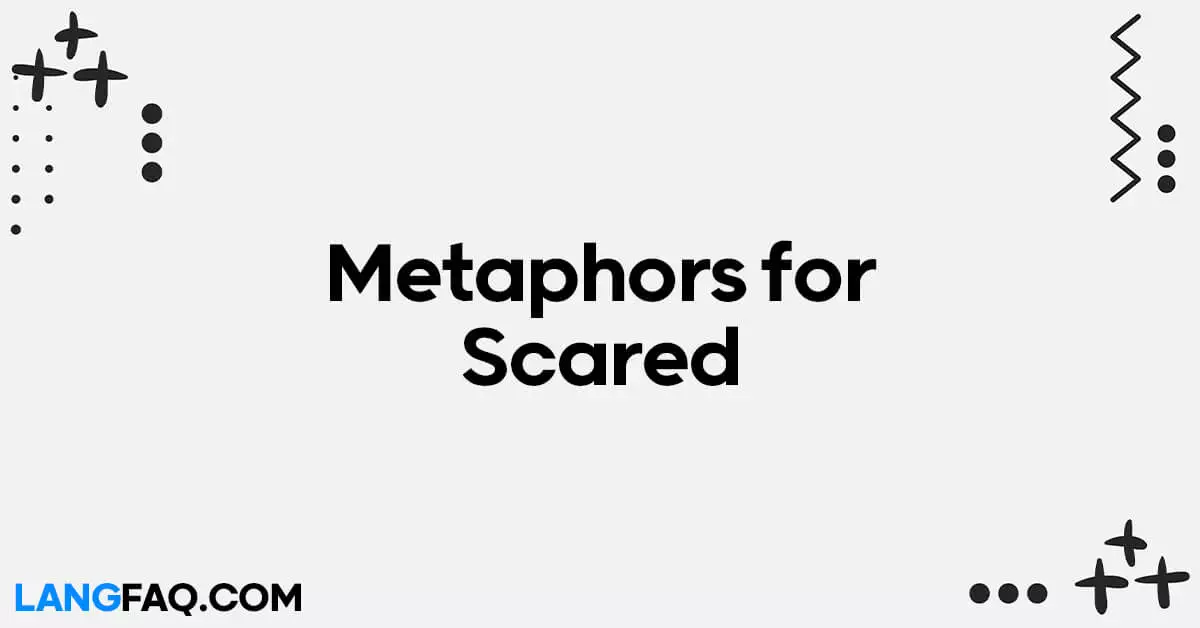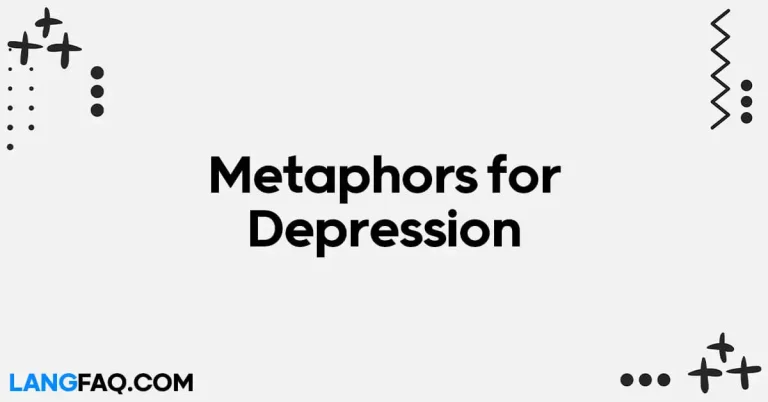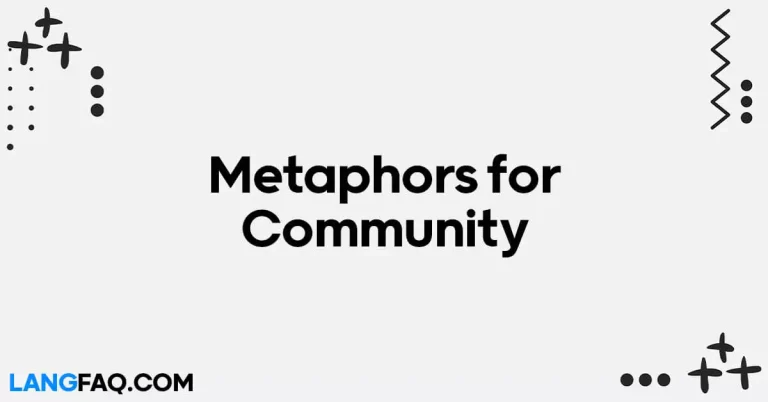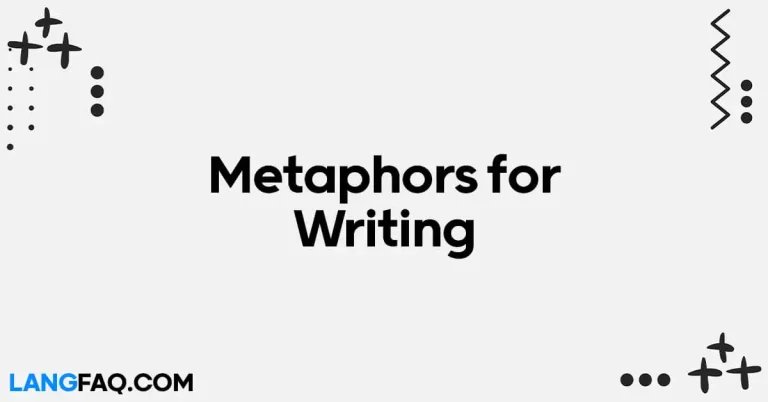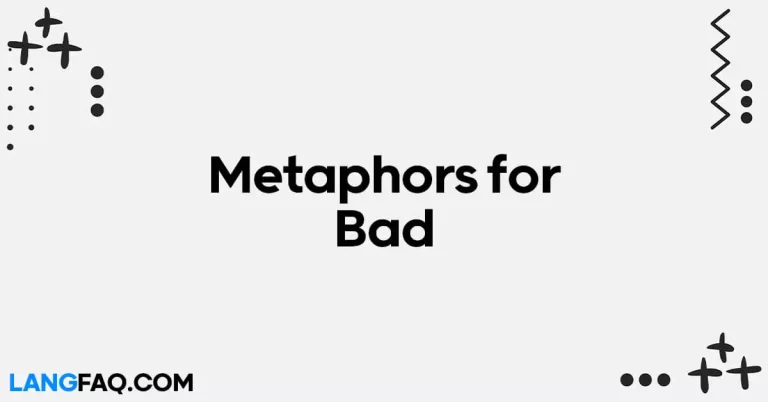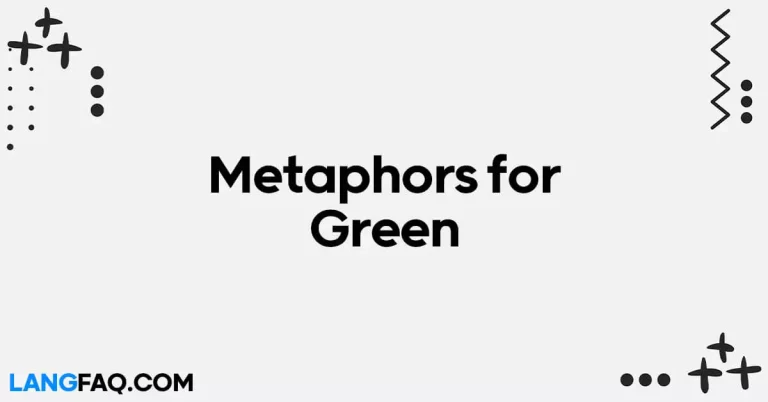Fear is a universal emotion that has been a rich source of inspiration for writers, poets, and storytellers throughout history. To truly convey the intensity of this emotion, one often turns to metaphors—expressions that paint a vivid picture in the reader’s mind. In this extensive guide, we will delve into 26 Metaphors for Scared, unlocking the creative potential of language to describe fear in unique and captivating ways.
26 Metaphors for Scared
- On Edge Like a Tightrope Walker: Imagine the constant tension of someone walking on a narrow rope high above the ground.
- Sweating Like a Marathon Runner: When fear hits, it can make you perspire profusely, much like a runner in a race.
- Heartbeats Drumming Like Thunder: Fear can make your heart pound like distant thunder.
- Like a Ship Lost in the Fog: Feeling scared can be like navigating through thick, disorienting fog with no clear path.
- Breathing as Shallow as a Puddle: Fear can cause your breath to become shallow, like a small puddle rather than a deep well.
- As Jumpy as a Jackrabbit: Feeling constantly alert and easily startled, much like a jittery jackrabbit.
- Hiding Like a Mouse from a Hawk: The urge to hide and stay unnoticed, similar to a mouse evading a predator.
- Staring Into the Abyss: A feeling of staring into a dark and unknown abyss, filled with uncertainty.
- Heartbeats Like a Fluttering Bird: Your heart can flutter with anxiety, resembling the rapid wings of a frightened bird.
- As Claustrophobic as a Caged Bird: Feeling trapped and confined, similar to a caged bird.
- Frozen Like a Statue: Feeling immobilized, like a statue frozen in place.
- Eyes Wide Like a Full Moon: Your eyes can widen in terror, resembling the full moon’s size and roundness.
- As Vulnerable as a Newborn Lamb: Feeling exposed and defenseless, much like a newborn lamb in the wild.
- Gasping for Air Like a Drowning Swimmer: The sensation of struggling to breathe, similar to a swimmer in distress.
- As Lost as a Ship Without a Compass: Feeling directionless and without guidance, like a ship adrift without a compass.
- Heart as Heavy as a Sinking Anchor: Your heart can feel heavy with fear, like an anchor sinking into the depths.
- Shaking Like a Leaf in the Wind: Trembling uncontrollably, resembling a leaf quivering in the breeze.
- As Isolated as a Deserted Island: Feeling utterly alone and isolated, like being on a deserted island.
- Mind Racing Like a Speeding Train: Thoughts can race through your mind at high speed, like a train hurtling down the tracks.
- As Numb as a Frostbitten Finger: Feeling emotionally numb, much like a finger affected by frostbite.
- Like a Puzzle Missing a Piece: A sense of incompleteness and uncertainty, like a puzzle with a missing piece.
- Heart in Your Throat Like an Elevator Stuck Between Floors: Feeling your heart in your throat, much like an elevator stuck between floors.
- As Tense as a Coiled Spring: Your body can become tense and wound up, like a coiled spring ready to snap.
- Eyes Darting Like a Cornered Animal: Constantly looking for an escape, resembling a cornered animal’s quick movements.
- As Slippery as a Wet Banana Peel: Feeling unstable and vulnerable, like stepping on a wet banana peel.
- Mind Like a Dark Alley: Thoughts can become as confusing and treacherous as navigating a dark, unfamiliar alley.
These metaphors offer creative ways to describe the sensation of fear and can be used effectively in writing to evoke vivid imagery and emotions.
| Metaphor | Meaning | Example |
|---|---|---|
| On Edge Like a Tightrope Walker | Constant tension and alertness | She felt on edge like a tightrope walker, always anxious. |
| Sweating Like a Marathon Runner | Profuse sweating due to fear | His fear had him sweating like a marathon runner. |
| Heartbeats Drumming Like Thunder | Intense, pounding heartbeats | Her heartbeats were drumming like thunder in her chest. |
| Like a Ship Lost in the Fog | Navigating through uncertainty | He felt like a ship lost in the fog of his own thoughts. |
| Breathing as Shallow as a Puddle | Shallow, rapid breaths | Fear had reduced her breathing to shallow puddle-like breaths. |
| As Jumpy as a Jackrabbit | Easily startled and hyperalert | He was as jumpy as a jackrabbit after the loud noise. |
| Hiding Like a Mouse from a Hawk | Seeking refuge and staying unnoticed | She was hiding like a mouse from a hawk, trying to avoid attention. |
| Staring Into the Abyss | Facing deep uncertainty and dread | His decision had him staring into the abyss of the unknown. |
| Heartbeats Like a Fluttering Bird | Rapid, fluttering heartbeats | Her heartbeats were like a fluttering bird in her chest. |
| As Claustrophobic as a Caged Bird | Feeling trapped and confined | The small room made her feel claustrophobic, like a caged bird. |
| Frozen Like a Statue | Immobilized by fear | Fear had left him frozen like a statue, unable to move. |
| Eyes Wide Like a Full Moon | Wide-eyed in alarm | Her eyes were wide like a full moon with fear. |
| As Vulnerable as a Newborn Lamb | Exposed and defenseless | He felt as vulnerable as a newborn lamb in the wilderness. |
| Gasping for Air Like a Drowning Swimmer | Struggling to breathe | Fear had her gasping for air like a drowning swimmer. |
| As Lost as a Ship Without a Compass | Feeling directionless and lost | Without a plan, he was as lost as a ship without a compass. |
| Heart as Heavy as a Sinking Anchor | A heavy, sinking feeling in the chest | The news left him with a heart as heavy as a sinking anchor. |
| Shaking Like a Leaf in the Wind | Trembling uncontrollably | Fear had her shaking like a leaf in the wind. |
| As Isolated as a Deserted Island | Feeling alone and isolated | In the crowd, he felt as isolated as a deserted island. |
| Mind Racing Like a Speeding Train | Rapid, overwhelming thoughts | His mind was racing like a speeding train with anxiety. |
| As Numb as a Frostbitten Finger | Emotionally numb | The shock left her feeling as numb as a frostbitten finger. |
| Like a Puzzle Missing a Piece | A sense of incompleteness and uncertainty | His life felt like a puzzle missing a piece, lacking clarity. |
| Heart in Your Throat Like an Elevator Stuck Between Floors | Feeling of heart in the throat | The shocking news had her heart in her throat, like an elevator stuck between floors. |
| As Tense as a Coiled Spring | High tension and readiness to react | His body was as tense as a coiled spring, ready for action. |
| Eyes Darting Like a Cornered Animal | Constantly looking for an escape | Fear had her eyes darting like a cornered animal, searching for an exit. |
| As Slippery as a Wet Banana Peel | Feeling unstable and vulnerable | The uncertain situation made him feel as slippery as a wet banana peel. |
| Mind Like a Dark Alley | Confusing and treacherous thoughts | His thoughts were like a dark alley, full of uncertainty. |
These metaphors provide creative ways to describe the feeling of fear, allowing writers to evoke vivid imagery and emotions in their writing.
Feeling On Edge Like a Tightrope Walker
Explanation: When you feel on edge like a tightrope walker, you’re experiencing constant tension and alertness, much like someone balancing on a thin rope high above the ground.
Scenario: Imagine you’re working on an important project at your workplace, and there’s a lot at stake. You might tell your colleague:
Formal: “I’ve been feeling on edge like a tightrope walker lately due to the upcoming client presentation.”
Informal: “I’ve been on edge like a tightrope walker with this project, you know?”
Variations:
- Colleagues: “I’ve been on edge like a tightrope walker with this project, as it’s crucial for our team.”
- Friends: “Man, this project has me feeling like a tightrope walker on the edge!”
- Mentor-Mentee: “It’s common to feel on edge like a tightrope walker when handling high-stakes projects. Let’s discuss some strategies to manage the pressure.”
Pros:
- Evokes a vivid image of tension and alertness.
- Easily relatable in both formal and informal contexts.
Cons:
- May sound slightly dramatic if overused.
Grammar/Usage Rule:
- Use “feeling on edge” when describing the sensation.
- Combine with “like a tightrope walker” for added emphasis.
Definition:
- “On edge” means to be in a state of nervousness or unease.
Sweating Like a Marathon Runner
Explanation: This metaphor represents profuse sweating due to fear, much like a marathon runner sweating during a race.
Scenario: You’re about to give a public speech, and you’re anxious. You might say:
Formal: “I’ll be honest; I’m sweating like a marathon runner at the starting line.”
Informal: “I’m sweating like a marathon runner here, guys!”
Variations:
- Colleagues: “I admit, I’m sweating like a marathon runner before this presentation.”
- Friends: “I’m totally sweating like a marathon runner before my speech. It’s nerve-wracking!”
- Mentor-Mentee: “It’s not uncommon to start sweating like a marathon runner before a big presentation. Let’s work on some relaxation techniques.”
Pros:
- Graphic description of nervousness.
- Suitable for various contexts.
Cons:
- May imply extreme anxiety.
Grammar/Usage Rule:
- Use “sweating like a marathon runner” to emphasize the intensity of sweating.
Definition:
- “Sweating like a marathon runner” refers to excessive sweating, usually due to nervousness or stress.
Heartbeats Drumming Like Thunder
Explanation: This metaphor portrays intense, pounding heartbeats, akin to the sound of distant thunder.
Scenario: You’re awaiting the results of a crucial exam. Your conversation might go like this:
Formal: “As I waited for the exam results, I could feel my heartbeats drumming like thunder.”
Informal: “Man, my heartbeats were drumming like thunder while waiting for those results!”
Variations:
- Colleagues: “I couldn’t help but notice my heartbeats drumming like thunder during the meeting.”
- Friends: “My heartbeats were drumming like thunder when I asked her out!”
- Mentor-Mentee: “Feeling heartbeats drumming like thunder in high-pressure situations is common. Let’s discuss strategies to manage it.”
Pros:
- Evokes a powerful sensory image.
- Applicable in various contexts.
Cons:
- May suggest extreme nervousness.
Grammar/Usage Rule:
- Use “heartbeats drumming like thunder” to describe the intensity of heartbeat.
Definition:
- “Heartbeats drumming like thunder” signifies the sensation of rapid, intense heartbeats, often due to anxiety or excitement.
Like a Ship Lost in the Fog
Explanation: This metaphor implies navigating through uncertainty, much like a ship trying to find its way in thick, disorienting fog.
Scenario: You’re discussing a challenging decision with a colleague:
Formal: “The options are so confusing; it’s like being a ship lost in the fog.”
Informal: “I feel like a ship lost in the fog with these choices!”
Variations:
- Colleagues: “The project’s direction is unclear; it’s like a ship lost in the fog.”
- Friends: “Choosing a career path can make you feel like a ship lost in the fog, doesn’t it?”
- Mentor-Mentee: “When faced with uncertainty, it’s natural to feel like a ship lost in the fog. Let’s work on finding clarity together.”
Pros:
- Conveys a strong sense of confusion.
- Suitable for professional and casual discussions.
Cons:
- May imply feeling directionless.
Grammar/Usage Rule:
- Use “like a ship lost in the fog” to emphasize the feeling of uncertainty.
Definition:
- “Like a ship lost in the fog” describes a state of confusion and uncertainty when making decisions or navigating challenges.
Breathing as Shallow as a Puddle
Explanation: This metaphor signifies shallow, rapid breaths, resembling a small puddle rather than a deep well.
Scenario: You’re discussing a stressful situation with a friend:
Formal: “When I heard the news, my breathing became as shallow as a puddle.”
Informal: “The news hit me hard; I was breathing as shallow as a puddle.”
Variations:
- Colleagues: “During the crisis, my breathing got as shallow as a puddle.”
- Friends: “I hate confrontations; they make my breathing shallow as a puddle.”
- Mentor-Mentee: “Shallow breathing is a common response to stress. Let’s explore techniques to manage it.”
Pros:
- Describes the physical effect of stress.
- Applicable in various situations.
Cons:
- Suggests anxiety or distress.
Grammar/Usage Rule:
- Use “breathing as shallow as a puddle” to convey the shallowness of breath.
Definition:
- “Breathing as shallow as a puddle” describes rapid and shallow breaths, typically due to stress or anxiety.
As Jumpy as a Jackrabbit
Explanation: This metaphor conveys a state of being easily startled and hyperalert, much like a jittery jackrabbit.
Scenario: You’re at a spooky movie night with friends, and everyone jumps at a sudden loud noise:
Formal: “We were all as jumpy as jackrabbits after that unexpected sound.”
Informal: “Did you see us? We were all jumpy as jackrabbits!”
Variations:
- Colleagues: “The unexpected announcement made everyone as jumpy as jackrabbits in the office.”
- Friends: “I’m always jumpy as a jackrabbit when watching horror movies!”
- Mentor-Mentee: “Feeling jumpy as a jackrabbit in stressful situations is natural. Let’s explore ways to stay composed.”
Pros:
- Creates a lively image of being easily startled.
- Appropriate in casual and formal conversations.
Cons:
- Can imply nervousness or anxiety.
Grammar/Usage Rule:
- Use “jumpy as a jackrabbit” to emphasize the state of being easily startled.
Definition:
- “Jumpy as a jackrabbit” describes a heightened state of alertness and being easily startled, often due to nervousness or surprise.
Hiding Like a Mouse from a Hawk
Explanation: This metaphor signifies seeking refuge and staying unnoticed, similar to a mouse evading a predator.
Scenario: You’re discussing a friend’s behavior during a social gathering:
Formal: “She spent the entire party hiding like a mouse from a hawk.”
Informal: “Did you see her? She was hiding like a mouse from a hawk at the party!”
Variations:
- Colleagues: “During the meeting, he was hiding like a mouse from a hawk, not contributing much.”
- Friends: “I tend to hide like a mouse from a hawk at big family gatherings.”
- Mentor-Mentee: “Feeling the need to hide like a mouse from a hawk in social situations is common. Let’s work on boosting your confidence.”
Pros:
- Depicts the desire to avoid attention or conflict.
- Suitable for both formal and informal contexts.
Cons:
- May imply shyness or introversion.
Grammar/Usage Rule:
- Use “hiding like a mouse from a hawk” to emphasize the act of avoiding notice.
Definition:
- “Hiding like a mouse from a hawk” describes the behavior of seeking refuge and staying unnoticed, typically to avoid confrontation or unwanted attention.
Staring Into the Abyss
Explanation: This metaphor symbolizes facing deep uncertainty and dread, much like staring into an abyss of the unknown.
Scenario: You’re discussing a challenging life decision with your mentor:
Formal: “As I contemplated the decision, it felt like I was staring into the abyss.”
Informal: “I don’t know what to do; it’s like I’m staring into the abyss.”
Variations:
- Colleagues: “The project’s future is uncertain; it’s like we’re all staring into the abyss.”
- Friends: “Choosing a career path sometimes feels like staring into the abyss.”
- Mentor-Mentee: “When faced with uncertainty, it’s natural to feel like you’re staring into the abyss. Let’s explore strategies to gain clarity.”
Pros:
- Evokes a powerful image of uncertainty and dread.
- Applicable in various contexts, both formal and informal.
Cons:
- May imply feeling overwhelmed by uncertainty.
Grammar/Usage Rule:
- Use “staring into the abyss” to emphasize the act of facing the unknown.
Definition:
- “Staring into the abyss” signifies confronting deep uncertainty or a daunting challenge, often accompanied by feelings of dread.
Heartbeats Like a Fluttering Bird
Explanation: This metaphor portrays rapid, fluttering heartbeats, resembling the quick wings of a frightened bird.
Scenario: You’re sharing your experience of a thrilling adventure with friends:
Formal: “As I stood at the edge of the cliff, my heartbeats were like a fluttering bird.”
Informal: “I felt like my heartbeats were a fluttering bird when I looked down from that cliff!”
Variations:
- Colleagues: “During the intense negotiation, my heartbeats were like a fluttering bird.”
- Friends: “Meeting my crush makes my heartbeats flutter like a bird!”
- Mentor-Mentee: “Experiencing heartbeats like a fluttering bird in nerve-wracking situations is common. Let’s discuss strategies to manage it.”
Pros:
- Creates a vivid image of rapid heartbeat.
- Suitable for various contexts.
Cons:
- May suggest excitement or nervousness.
Grammar/Usage Rule:
- Use “heartbeats like a fluttering bird” to describe the sensation of rapid, fluttering heartbeats.
Definition:
- “Heartbeats like a fluttering bird” conveys the feeling of rapid and anxious heartbeats, often experienced in thrilling or nerve-wracking situations.
As Claustrophobic as a Caged Bird
Explanation: This metaphor represents feeling trapped and confined, similar to a caged bird.
Scenario: You’re discussing your experience in a crowded elevator with a colleague:
Formal: “In that elevator, I felt as claustrophobic as a caged bird.”
Informal: “Man, I was as claustrophobic as a caged bird in that packed elevator!”
Variations:
- Colleagues: “During the conference, the small meeting room made me feel claustrophobic as a caged bird.”
- Friends: “I hate being in tight spaces; it makes me as claustrophobic as a caged bird!”
- Mentor-Mentee: “Feeling claustrophobic as a caged bird in confined spaces is common. Let’s explore ways to manage that anxiety.”
Pros:
- Depicts the sensation of being trapped.
- Applicable in both formal and informal discussions.
Cons:
- May suggest discomfort or anxiety.
Grammar/Usage Rule:
- Use “claustrophobic as a caged bird” to emphasize the feeling of confinement.
Definition:
- “Claustrophobic as a caged bird” describes the sensation of feeling trapped or confined, typically in small or crowded spaces.
Gasping for Air Like a Drowning Swimmer
Explanation: This metaphor signifies the struggle to breathe, similar to a swimmer in distress.
Scenario: You’re explaining your reaction to a shocking revelation:
Formal: “When I heard the news, I felt like I was gasping for air like a drowning swimmer.”
Informal: “The news hit me hard; I was gasping for air like a drowning swimmer!”
Variations:
- Colleagues: “During the crisis, it felt like we were all gasping for air like drowning swimmers.”
- Friends: “Breaking up with someone can leave you feeling like you’re gasping for air like a drowning swimmer.”
- Mentor-Mentee: “Experiencing the sensation of gasping for air like a drowning swimmer in stressful situations is common. Let’s discuss strategies to cope.”
Pros:
- Describes the physical impact of shock or distress.
- Suitable for various contexts.
Cons:
- Implies a sense of suffocation or panic.
Grammar/Usage Rule:
- Use “gasping for air like a drowning swimmer” to convey the struggle to breathe.
Definition:
- “Gasping for air like a drowning swimmer” describes the feeling of struggling to breathe, often due to shock, anxiety, or intense emotion.
As Lost as a Ship Without a Compass
Explanation: This metaphor represents feeling directionless and lost, akin to a ship adrift without a compass.
Scenario: You’re discussing a challenging phase in your career with a friend:
Formal: “In my current job, I often feel as lost as a ship without a compass.”
Informal: “Honestly, I feel lost as a ship without a compass in this job.”
Variations:
- Colleagues: “Navigating this complex project can leave you feeling as lost as a ship without a compass.”
- Friends: “Choosing a major in college can make you feel as lost as a ship without a compass!”
- Mentor-Mentee: “Experiencing a sense of being lost as a ship without a compass in your career is common. Let’s work on setting clear goals.”
Pros:
- Conveys the sense of feeling directionless.
- Appropriate for both formal and informal conversations.
Cons:
- May imply a lack of purpose or guidance.
Grammar/Usage Rule:
- Use “as lost as a ship without a compass” to emphasize the feeling of being directionless.
Definition:
- “As lost as a ship without a compass” describes the sensation of feeling directionless and lacking guidance or purpose.
Heart as Heavy as a Sinking Anchor
Explanation: This metaphor signifies a heavy, sinking feeling in the chest, much like an anchor sinking into the depths.
Scenario: You’re describing the emotional impact of a recent loss to your mentor:
Formal: “After the loss, I carried a heart as heavy as a sinking anchor.”
Informal: “My heart was as heavy as a sinking anchor after that.”
Variations:
- Colleagues: “The setback in the project left me with a heart as heavy as a sinking anchor.”
- Friends: “Breaking up with someone can leave you with a heart as heavy as a sinking anchor, can’t it?”
- Mentor-Mentee: “Experiencing a heavy heart as heavy as a sinking anchor after setbacks is common. Let’s work on resilience.”
Pros:
- Depicts the emotional weight of a situation.
- Suitable for various contexts.
Cons:
- Suggests deep sadness or grief.
Grammar/Usage Rule:
- Use “heart as heavy as a sinking anchor” to convey the emotional weight.
Definition:
- “Heart as heavy as a sinking anchor” describes the feeling of profound sadness or emotional burden, often associated with loss or disappointment.
Shaking Like a Leaf in the Wind
Explanation: This metaphor portrays trembling uncontrollably, resembling a leaf quivering in the breeze.
Scenario: You’re recounting your experience during a nerve-wracking interview:
Formal: “During the interview, I couldn’t stop shaking like a leaf in the wind.”
Informal: “That interview had me shaking like a leaf in the wind, you won’t believe it!”
Variations:
- Colleagues: “Public speaking makes some people shake like a leaf in the wind.”
- Friends: “First dates can leave you shaking like a leaf in the wind!”
- Mentor-Mentee: “Experiencing physical tremors like shaking like a leaf in the wind during stressful situations is common. Let’s explore ways to build confidence.”
Pros:
- Vividly describes physical tremors.
- Applicable in various contexts.
Cons:
- Implies intense nervousness.
Grammar/Usage Rule:
- Use “shaking like a leaf in the wind” to emphasize the uncontrollable trembling.
Definition:
- “Shaking like a leaf in the wind” conveys the sensation of trembling uncontrollably, often due to anxiety or fear.
As Isolated as a Deserted Island
Explanation: This metaphor signifies feeling utterly alone and isolated, akin to being on a deserted island.
Scenario: You’re discussing the emotions you felt after moving to a new city with a friend:
Formal: “In the beginning, I felt as isolated as a deserted island in this new city.”
Informal: “I was so lonely, it was like being on a deserted island when I first moved here!”
Variations:
- Colleagues: “Starting a new job can make you feel as isolated as a deserted island until you get to know your colleagues.”
- Friends: “After the breakup, I felt isolated as a deserted island; it was tough.”
- Mentor-Mentee: “Experiencing isolation like a deserted island in new situations is common. Let’s discuss strategies to build connections.”
Pros:
- Depicts a strong sense of loneliness.
- Suitable for formal and informal discussions.
Cons:
- May suggest intense isolation.
Grammar/Usage Rule:
- Use “as isolated as a deserted island” to emphasize the feeling of extreme loneliness.
Definition:
- “As isolated as a deserted island” describes the sensation of being completely alone and cut off from others, often accompanied by feelings of loneliness and isolation.
Mind Racing Like a Speeding Train
Explanation: This metaphor portrays thoughts racing through your mind at high speed, much like a train hurtling down the tracks.
Scenario: You’re explaining how your mind was during a high-pressure exam:
Formal: “During the exam, my mind was racing like a speeding train.”
Informal: “I couldn’t focus at all during that test; my mind was racing like a speeding train!”
Variations:
- Colleagues: “When you have tight deadlines, your mind can start racing like a speeding train.”
- Friends: “I hate overthinking; my mind starts racing like a speeding train!”
- Mentor-Mentee: “Experiencing a racing mind like a speeding train under pressure is common. Let’s explore techniques to stay calm.”
Pros:
- Creates a vivid image of racing thoughts.
- Applicable in various contexts.
Cons:
- Implies a lack of mental control.
Grammar/Usage Rule:
- Use “mind racing like a speeding train” to describe the rapid flow of thoughts.
Definition:
- “Mind racing like a speeding train” conveys the sensation of having thoughts move quickly and uncontrollably, often due to stress or anxiety.
As Numb as a Frostbitten Finger
Explanation: This metaphor signifies feeling emotionally numb, much like a finger affected by frostbite.
Scenario: You’re sharing your reaction to a shocking event with a colleague:
Formal: “After hearing the news, I felt emotionally numb, like a frostbitten finger.”
Informal: “I was so shocked; I felt numb as a frostbitten finger.”
Variations:
- Colleagues: “After the company’s downsizing announcement, many of us felt emotionally numb, like frostbitten fingers.”
- Friends: “Breaking up can leave you feeling as numb as a frostbitten finger.”
- Mentor-Mentee: “Experiencing emotional numbness like a frostbitten finger in response to shocks is common. Let’s discuss emotional resilience.”
Pros:
- Describes the feeling of emotional detachment.
- Applicable in formal and informal conversations.
Cons:
- May suggest a lack of emotional response.
Grammar/Usage Rule:
- Use “as numb as a frostbitten finger” to emphasize emotional detachment.
Definition:
- “As numb as a frostbitten finger” describes the sensation of emotional numbness, often experienced in response to shocking or traumatic events.
Like a Puzzle Missing a Piece
Explanation: This metaphor represents a sense of incompleteness and uncertainty, akin to a puzzle with a missing piece.
Scenario: You’re discussing your career prospects with a mentor:
Formal: “At this point, my career feels like a puzzle missing a piece; I’m uncertain about the next step.”
Informal: “I don’t know where my career is headed; it’s like a puzzle missing a piece!”
Variations:
- Colleagues: “The project’s success seems like a puzzle missing a piece; we need a clear strategy.”
- Friends: “Finding your purpose can feel like a puzzle missing a piece sometimes.”
- Mentor-Mentee: “Experiencing uncertainty like a puzzle missing a piece in your career is common. Let’s work on setting clear goals.”
Pros:
- Depicts a sense of incompleteness and uncertainty.
- Appropriate for formal and informal discussions.
Cons:
- May suggest confusion or lack of clarity.
Grammar/Usage Rule:
- Use “like a puzzle missing a piece” to emphasize the feeling of uncertainty and incompleteness.
Definition:
- “Like a puzzle missing a piece” describes the sensation of feeling incomplete or uncertain, often related to decision-making or problem-solving.
Heart in Your Throat Like an Elevator Stuck Between Floors
Explanation: This metaphor signifies the feeling of your heart being in your throat, much like an elevator stuck between floors, creating a sense of suspense and anxiety.
Scenario: You’re describing the suspense in a thrilling movie to a friend:
Formal: “During the climax of the movie, my heart was in my throat like an elevator stuck between floors.”
Informal: “I couldn’t breathe during that movie’s climax; my heart was in my throat like an elevator stuck!”
Variations:
- Colleagues: “When the project’s success was uncertain, my heart was in my throat like an elevator stuck between floors.”
- Friends: “Watching a suspenseful game can get your heart in your throat like an elevator stuck!”
- Mentor-Mentee: “Experiencing suspense with your heart in your throat like an elevator stuck is common in high-pressure situations. Let’s discuss stress management.”
Pros:
- Creates a vivid image of suspense and anxiety.
- Applicable in various contexts.
Cons:
- Implies intense anxiety or suspense.
Grammar/Usage Rule:
- Use “heart in your throat like an elevator stuck between floors” to emphasize the feeling of suspense and anxiety.
Definition:
- “Heart in your throat like an elevator stuck between floors” describes the sensation of intense suspense and anxiety, often experienced during thrilling or nerve-wracking moments.
Like a Deer Caught in Headlights
Explanation: This metaphor conveys the feeling of being frozen in shock or surprise, similar to a deer pausing when caught in the headlights of a vehicle.
Scenario: You’re explaining how you reacted when unexpectedly meeting a celebrity:
Formal: “When I saw the celebrity, I was like a deer caught in headlights, completely speechless.”
Informal: “Meeting the celebrity left me stunned, like a deer caught in headlights!”
Variations:
- Colleagues: “During the presentation, I felt like a deer caught in headlights when asked an unexpected question.”
- Friends: “Seeing your crush unexpectedly can leave you like a deer caught in headlights, right?”
- Mentor-Mentee: “Experiencing shock like a deer caught in headlights is common in surprising situations. Let’s work on composure.”
Pros:
- Evokes a vivid image of being frozen in surprise.
- Applicable in both formal and informal conversations.
Cons:
- Suggests a momentary loss of composure.
Grammar/Usage Rule:
- Use “like a deer caught in headlights” to emphasize the state of being frozen in surprise.
Definition:
- “Like a deer caught in headlights” describes the sensation of being temporarily stunned or frozen in response to a surprising or unexpected situation.
As Restless as a Cat on a Hot Tin Roof
Explanation: This metaphor signifies extreme restlessness and agitation, much like a cat pacing nervously on a hot tin roof.
Scenario: You’re explaining your pre-exam anxiety to a colleague:
Formal: “Before the exam, I couldn’t sit still; I was as restless as a cat on a hot tin roof.”
Informal: “I was so anxious before the exam, I felt as restless as a cat on a hot tin roof!”
Variations:
- Colleagues: “When deadlines approach, some people become as restless as a cat on a hot tin roof.”
- Friends: “Waiting for the test results can make you as restless as a cat on a hot tin roof!”
- Mentor-Mentee: “Experiencing restlessness like a cat on a hot tin roof before important events is common. Let’s discuss relaxation techniques.”
Pros:
- Describes extreme restlessness and agitation.
- Suitable for various contexts.
Cons:
- May imply heightened anxiety.
Grammar/Usage Rule:
- Use “as restless as a cat on a hot tin roof” to emphasize extreme restlessness.
Definition:
- “As restless as a cat on a hot tin roof” conveys the sensation of being extremely agitated and unable to stay still, often due to anxiety or nervousness.
Mind as Blank as a New Notebook
Explanation: This metaphor signifies a complete lack of ideas or thoughts, similar to the blank pages of a new notebook.
Scenario: You’re discussing your writer’s block with a friend:
Formal: “I tried to write, but my mind was as blank as a new notebook.”
Informal: “I had writer’s block; my mind was completely blank as a new notebook!”
Variations:
- Colleagues: “During brainstorming sessions, some people’s minds go as blank as a new notebook.”
- Friends: “Ever had a moment when you’re talking, and your mind goes as blank as a new notebook?”
- Mentor-Mentee: “Experiencing mental blocks like a mind as blank as a new notebook is common. Let’s explore creativity exercises.”
Pros:
- Depicts a complete lack of ideas or thoughts.
- Applicable in both formal and informal discussions.
Cons:
- May suggest a creative block.
Grammar/Usage Rule:
- Use “mind as blank as a new notebook” to emphasize the absence of ideas or thoughts.
Definition:
- “Mind as blank as a new notebook” describes the sensation of having no thoughts or ideas, often associated with creative or mental blocks.
Trembling Like a Leaf in a Storm
Explanation: This metaphor portrays intense trembling, akin to a leaf shaking in a storm’s strong winds.
Scenario: You’re recounting your experience during a severe earthquake to a colleague:
Formal: “During the earthquake, I was trembling like a leaf in a storm.”
Informal: “That earthquake had me trembling like a leaf in a storm!”
Variations:
- Colleagues: “In emergency situations, it’s common for people to start trembling like a leaf in a storm.”
- Friends: “Getting up on stage to perform can make you tremble like a leaf in a storm!”
- Mentor-Mentee: “Experiencing physical tremors like trembling like a leaf in a storm during emergencies is common. Let’s discuss stress management.”
Pros:
- Creates a vivid image of intense trembling.
- Applicable in various contexts.
Cons:
- Implies intense fear or anxiety.
Grammar/Usage Rule:
- Use “trembling like a leaf in a storm” to describe the intensity of trembling.
Definition:
- “Trembling like a leaf in a storm” conveys the sensation of intense trembling or shaking, often due to fear, anxiety, or physical stress.
As Vulnerable as a Lamb in a Wolf’s Den
Explanation: This metaphor signifies extreme vulnerability and exposure, similar to a lamb surrounded by wolves.
Scenario: You’re describing your feelings during a high-stakes negotiation:
Formal: “In the negotiation room, I felt as vulnerable as a lamb in a wolf’s den.”
Informal: “Negotiating that deal left me feeling vulnerable as a lamb in a wolf’s den!”
Variations:
- Colleagues: “When facing tough competition, you can feel as vulnerable as a lamb in a wolf’s den.”
- Friends: “Job interviews can make you feel as vulnerable as a lamb in a wolf’s den, can’t they?”
- Mentor-Mentee: “Experiencing vulnerability like a lamb in a wolf’s den in high-pressure situations is common. Let’s work on assertiveness.”
Pros:
- Conveys extreme vulnerability and exposure.
- Applicable in both formal and informal discussions.
Cons:
- May imply a lack of protection or defense.
Grammar/Usage Rule:
- Use “as vulnerable as a lamb in a wolf’s den” to emphasize extreme vulnerability.
Definition:
- “As vulnerable as a lamb in a wolf’s den” describes the sensation of being in an extremely vulnerable and exposed position, often in situations where one feels defenseless or at a disadvantage.
As Unsteady as a Tightrope Walker Without a Net
Explanation: This metaphor represents feeling precarious and uncertain, much like a tightrope walker without a safety net.
Scenario: You’re explaining your anxiety before a crucial presentation:
Formal: “Before the presentation, I felt as unsteady as a tightrope walker without a net.”
Informal: “I was so nervous about the presentation; I felt unsteady as a tightrope walker without a net!”
Variations:
- Colleagues: “Presenting in front of the board can make anyone feel unsteady as a tightrope walker without a net.”
- Friends: “Public speaking can leave you as unsteady as a tightrope walker without a net!”
- Mentor-Mentee: “Experiencing anxiety like feeling unsteady as a tightrope walker without a net before important events is common. Let’s discuss confidence-building strategies.”
Pros:
- Depicts a sense of insecurity and uncertainty.
- Suitable for various contexts.
Cons:
- May imply a lack of confidence.
Grammar/Usage Rule:
- Use “as unsteady as a tightrope walker without a net” to emphasize the feeling of insecurity.
Definition:
- “As unsteady as a tightrope walker without a net” describes the sensation of feeling precarious and uncertain, often related to high-stakes situations.
Sweating Bullets Like a Suspect in the Interrogation Room
Explanation: This metaphor signifies profuse sweating, similar to a suspect being interrogated intensely.
Scenario: You’re describing how nervous you were during a job interview:
Formal: “During the interview, I was sweating bullets like a suspect in the interrogation room.”
Informal: “That interview had me sweating bullets, like a suspect in the interrogation room!”
Variations:
- Colleagues: “Job interviews can make you start sweating bullets like a suspect in the interrogation room.”
- Friends: “Ever had a moment when you’re so nervous, you start sweating bullets like a suspect?”
- Mentor-Mentee: “Experiencing intense nervousness like sweating bullets in high-pressure situations is common. Let’s discuss calming techniques.”
Pros:
- Creates a vivid image of profuse sweating.
- Applicable in various contexts.
Cons:
- Implies intense anxiety or nervousness.
Grammar/Usage Rule:
- Use “sweating bullets like a suspect in the interrogation room” to describe profuse sweating due to nervousness.
Definition:
- “Sweating bullets like a suspect in the interrogation room” conveys the sensation of sweating profusely, often in response to anxiety, pressure, or stress.
As Wobbly as a Newborn Giraffe
Explanation: This metaphor signifies a lack of stability and coordination, much like a newborn giraffe trying to stand.
Scenario: You’re recounting your experience learning a new sport to a friend:
Formal: “I was completely wobbly while learning to ski, like a newborn giraffe.”
Informal: “Learning to ski was a disaster; I felt as wobbly as a newborn giraffe!”
Variations:
- Colleagues: “Starting a new project can leave you feeling as wobbly as a newborn giraffe until you get the hang of it.”
- Friends: “Trying a new dance move for the first time can make you wobbly as a newborn giraffe!”
- Mentor-Mentee: “Experiencing a lack of stability like feeling wobbly as a newborn giraffe when starting something new is common. Let’s work on skill development.”
Pros:
- Depicts a lack of stability and coordination.
- Suitable for various contexts.
Cons:
- May imply a learning curve or inexperience.
Grammar/Usage Rule:
- Use “as wobbly as a newborn giraffe” to emphasize the lack of stability and coordination.
Definition:
- “As wobbly as a newborn giraffe” describes the sensation of lacking stability and coordination, often experienced when trying something new or unfamiliar.
Pulse Racing Like a Marathon Runner
Explanation: This metaphor portrays a rapidly beating pulse, akin to a marathon runner’s heart rate during a race.
Scenario: You’re describing your excitement before a long-awaited event:
Formal: “Before the concert, my pulse was racing like a marathon runner.”
Informal: “I was so thrilled about the concert; my heart was racing like a marathon runner’s!”
Variations:
- Colleagues: “Anticipating the product launch can get your pulse racing like a marathon runner.”
- Friends: “Going on a first date can leave your heart racing like a marathon runner’s!”
- Mentor-Mentee: “Experiencing excitement like a racing pulse before significant events is common. Let’s discuss managing pre-event jitters.”
Pros:
- Creates a vivid image of a rapidly beating heart.
- Applicable in various contexts.
Cons:
- May imply heightened excitement or nervousness.
Grammar/Usage Rule:
- Use “pulse racing like a marathon runner” to describe the rapid heartbeat.
Definition:
- “Pulse racing like a marathon runner” conveys the sensation of a rapidly beating pulse, often experienced in moments of intense excitement or anticipation.
As Hesitant as a Novice Diver on a Cliff
Explanation: This metaphor signifies extreme hesitation and uncertainty, much like a novice diver standing on a cliff’s edge.
Scenario: You’re explaining your reluctance to make a major decision to a colleague:
Formal: “When faced with that decision, I was as hesitant as a novice diver on a cliff.”
Informal: “I just couldn’t make up my mind about it; I was hesitant as a novice diver on a cliff!”
Variations:
- Colleagues: “Starting a new project can make you feel as hesitant as a novice diver on a cliff.”
- Friends: “Making life-changing choices can leave you hesitant as a novice diver on a cliff!”
- Mentor-Mentee: “Experiencing hesitation like a novice diver on a cliff when making significant decisions is common. Let’s work on decision-making skills.”
Pros:
- Conveys extreme hesitation and uncertainty.
- Suitable for formal and informal discussions.
Cons:
- May imply a reluctance to take risks.
Grammar/Usage Rule:
- Use “as hesitant as a novice diver on a cliff” to emphasize extreme hesitation.
Definition:
- “As hesitant as a novice diver on a cliff” describes the sensation of being extremely hesitant and uncertain, often in the face of significant decisions or risks.
FAQs
Can I use these metaphors in my writing?
Absolutely! These metaphors are excellent tools for writers to convey fear in a vivid and engaging way.
Are there other metaphors for fear?
Certainly! These are just a starting point. You can create your own metaphors based on personal experiences and observations.
How do metaphors enhance storytelling?
Metaphors add depth and color to your writing, allowing readers to connect with the emotions and experiences of your characters.
Should I use metaphors sparingly?
Yes, it’s important not to overuse metaphors. They should enhance your writing, not overwhelm it.
Can metaphors be used in other contexts besides fear?
Metaphors are versatile and can be used in various contexts to create vivid imagery and evoke emotions.
Where can I learn more about using metaphors in writing?
There are many resources and books on the art of using metaphors effectively in writing. Consider exploring them to further enhance your skills.
Conclusion
In the realm of human emotions, fear stands as one of the most potent and universally recognized feelings. By exploring these 26 Metaphors for Scared, you gain a powerful tool to express and understand fear in its many facets. These metaphors can breathe life into your writing, making it more engaging and relatable to your readers. So, fear not—embrace the world of expressive language and let your words evoke emotions that resonate with your audience.

